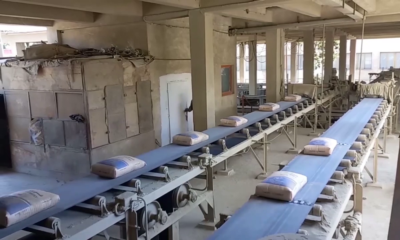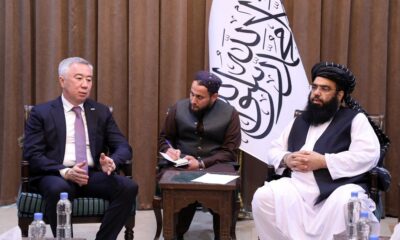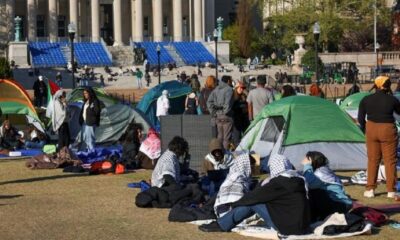World
Israeli drone kills deputy Hamas chief in Beirut
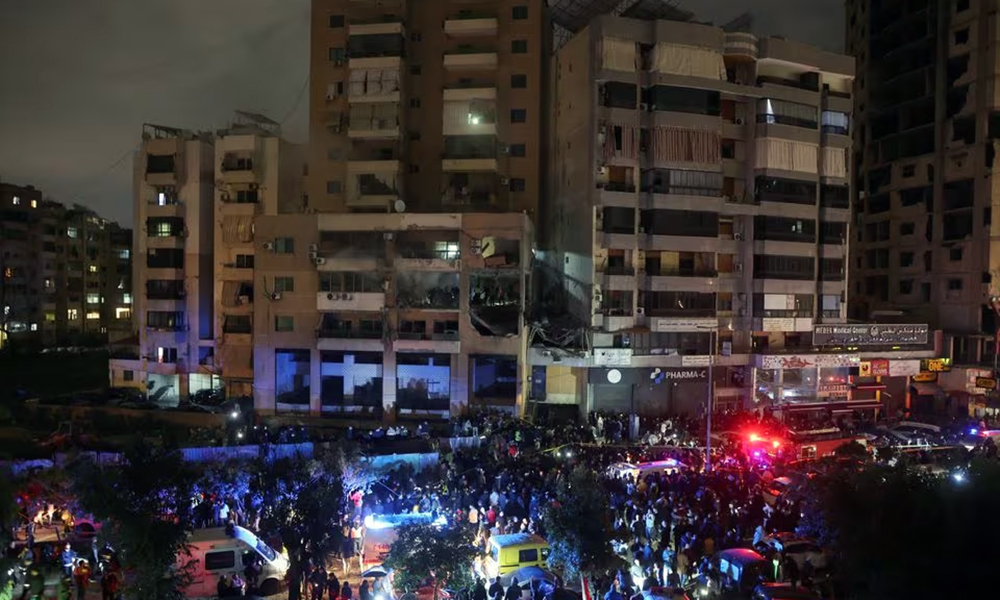
Deputy Hamas chief Saleh al-Arouri was killed on Tuesday night in an Israeli drone strike on Beirut’s southern suburbs of Dahiyeh, a stronghold of the allied Lebanese militant group Hezbollah, signalling the conflict between Hamas and Israel could be expanding to engulf more of the region, Reuters reported.
In response to questions from Reuters, the Israeli military said it does not respond to reports in the foreign media.
Lebanon’s national news agency said the drone struck a Hamas office. Two security sources said the strike had targeted a meeting between Hamas officials and Lebanon’s Sunni Islamist Jama’a Islamiya faction and left a total of four Palestinians and three Lebanese dead.
The strike marks the first targeted assassination of a Hamas official outside Palestinian Territories since the Palestinian group’s deadly assault on Israeli territory on Oct. 7, read the report.
Mark Regev, an adviser to Israeli Prime Minister Benjamin Netanyahu, told MSNBC that Israel had not taken responsibility for this attack, but “whoever did it, it must be clear: That this was not an attack on the Lebanese state.”
“Whoever did this did a surgical strike against the Hamas leadership,” Regev said in the interview.
Arouri was deputy head of Hamas’s politburo and a founder of its military wing, the Qassam Brigades.
He had spent time recently in both Lebanon and Qatar, which has mediated talks between Hamas and Israel including on hostages Hamas took in its Oct. 7 assault. The U.S., which brands Hamas a terrorist group, had last year offered $5 million for information on Arouri.
Hamas confirmed Arouri’s killing and said Qassam Brigade officials Samir Findi Abu Amer and Azzam Al-Aqraa Abu Ammar were also killed.
Hamas chief Ismail Haniyeh on Tuesday said Arouri’s killing is “terrorist act,” a violation of Lebanon’s sovereignty and an expansion of Israel’s hostility against Palestinians.
Islamic Jihad vowed revenge in a statement, saying: “This crime will not go unpunished and the resistance will continue until the occupation is removed.”
Iran said the killing would further galvanize the fight against Israel, while Yemen’s Houthi movement expressed condolences.
In Ramallah in the Israeli-occupied West Bank, hundreds took to the streets to urge retaliation, shouting “Revenge, revenge, Qassam.”
A Reuters witness in Dahiyeh saw firefighters and paramedics gathered around a multi-storey building with a gaping hole in what appeared to be the third floor. Limbs and other pieces of flesh could be seen on the roadside.
Lebanon’s caretaker prime minister Najib Mikati called the strike a “new Israeli crime” and said it was an attempt to pull Lebanon into war. His office said he asked Lebanon’s foreign minister to file a complaint to the United Nations Security Council.
In a written statement, Hezbollah said the attack “will not go without a response or punishment,” adding that the resistance has “its finger on the trigger.” It announced an attack on Israeli forces across the border but did not specify whether it was in response to Arouri’s killing, Reuters reported.
Hezbollah chief Sayyed Hassan Nasrallah plans an address on Wednesday to commemorate the fourth anniversary of the killing of Iranian Quds Force chief Qassem Suleimani in a U.S. drone strike on Baghdad.
In a televised speech in August, Nasrallah had cautioned Israel against carrying out any assassinations on Lebanese soil, vowing a “severe reaction.”
Hezbollah controls security in the southern suburb of Dahiyeh. In 2019, two Israeli drones crashed in the district.
Hezbollah has been exchanging near-daily fire with Israel since Hamas carried out the Oct. 7 attack, but the violence has mostly been limited to the border region between Lebanon and Israel, read the report.
Israeli air strikes and shelling have killed more than 100 Hezbollah fighters and nearly two dozen civilians since then, including children, elderly people and several journalists.
Israel says 1,200 people were killed and 240 were taken hostage on Oct. 7. Israel has responded with a nearly three-month-old offensive in Hamas-run Gaza where Palestinian health officials say the death toll has surpassed 22,000.
World
Police arrest scores of pro-Palestinian protesters on US university campuses
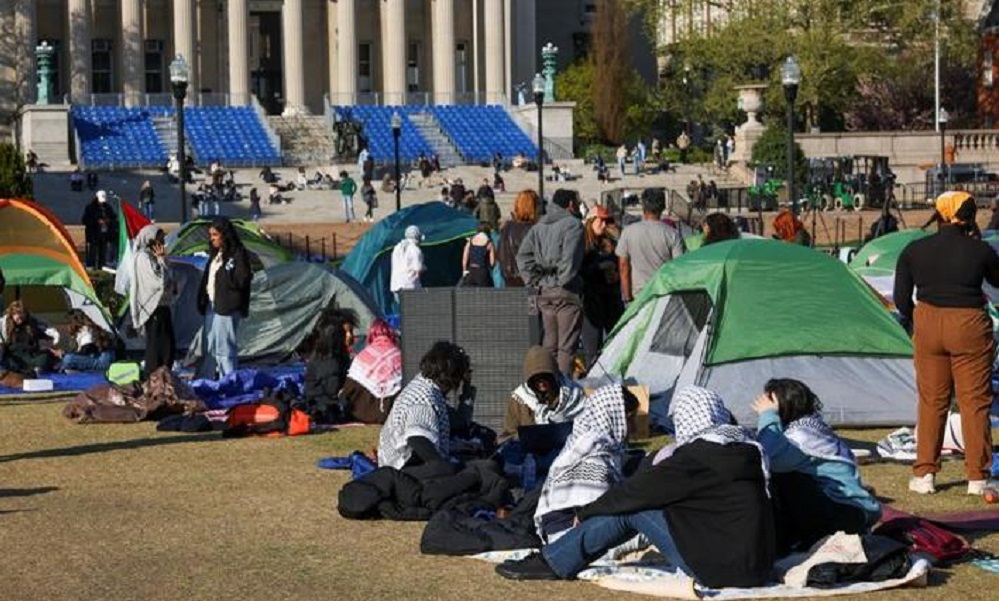
Pro-Palestinian protesters were arrested on a handful of U.S. university campuses on Saturday, as activists vowed to keep up the movement seeking a ceasefire in Israel’s war with Hamas among other demands.
The Indiana University police department in Bloomington said in an emailed statement that 23 protesters were arrested there.
Indiana State Police along with Indiana University police told demonstrators they could not pitch tents and camp on campus. When the tents were not removed, police arrested and transported protesters to the Monroe County Justice Center on charges of criminal trespass and resisting arrest.
“The Indiana University Police Department continues to support peaceful protests on campus that follow university policy,” the police statement read.
Pro-Palestinian protests have spread to college campuses across the U.S., stoked by the mass arrest of over 100 people on Columbia University’s campus last week.
In addition to a ceasefire, protesters are demanding that their schools divest from companies involved with Israel’s military and seeking an end to U.S. military assistance for Israel along with amnesty for students and faculty members who have been disciplined or fired for protesting.
School leaders at several universities have responded in the past week by asking police to clear out camps and arrest those who refuse to leave. While saying they defend free speech rights to protest, the leaders say they will not abide activists infringing on campus policies against hate speech or camping out on university grounds.
Massachusetts State Police said in a statement that they helped clear out a protest encampment at Northeastern University in Boston and that 102 protesters who refused to leave were arrested and will be charged with trespassing.
Northeastern University said in a statement on social media that it decided to call in police as “what began as a student demonstration two days ago was infiltrated by professional organizers with no affiliation to Northeastern.”
At Arizona State University, campus police arrested 69 protesters early Saturday, the school said in a statement.
The university said “a group of people – most of whom were not ASU students, faculty or staff – created an encampment and demonstration” and were arrested and charged with criminal trespass after refusing to disperse. – REUTERS
World
Hamas says it received Israel’s response to its ceasefire proposal
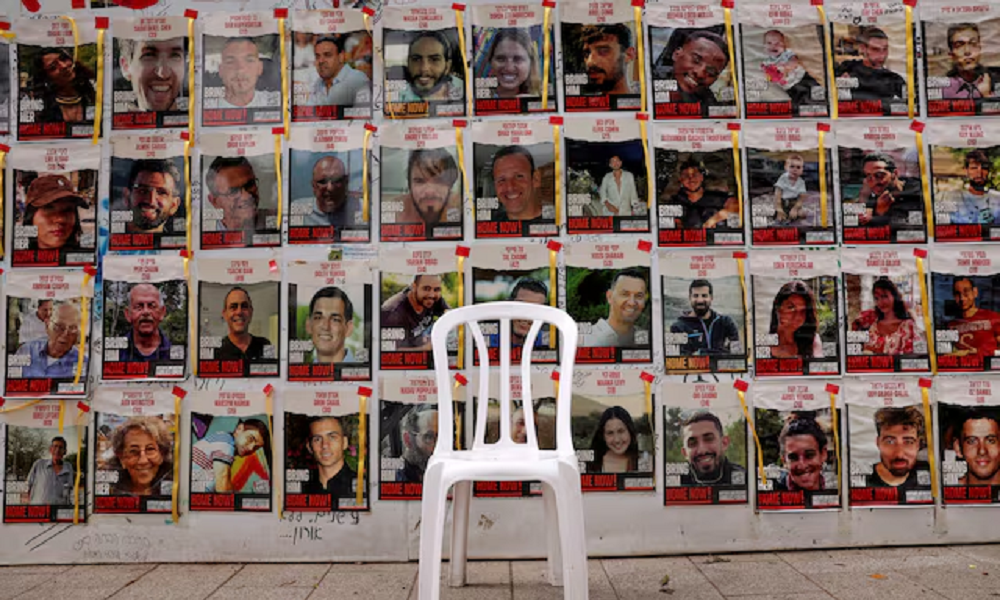
Hamas said it had received on Saturday Israel’s official response to its latest ceasefire proposal and will study it before submitting its reply, the group’s deputy Gaza chief said in a statement.
“Hamas has received today the official response of the Zionist occupation to the proposal presented to the Egyptian and the Qatari mediators on April 13,” Khalil Al-Hayya, who is currently based in Qatar, said in a statement published by the group.
After more than six months of war with Israel in Gaza, the negotiations remain deadlocked, with Hamas sticking to its demands that any agreement must end the war.
An Egyptian delegation visited Israel for discussion with Israeli officials on Friday, looking for a way to restart talks to end the conflict and return remaining hostages taken when Hamas fighters stormed into Israeli towns on Oct. 7, an official briefed on the meetings said.
The official, who spoke on condition of anonymity, said Israel had no new proposals to make, although it was willing to consider a limited truce in which 33 hostages would be released by Hamas, instead of the 40 previously under discussion.
On Thursday, the United States and 17 other countries appealed to Hamas to release all of its hostages as a pathway to end the crisis.
Hamas has vowed not to relent to international pressure but in a statement it issued on Friday it said it was “open to any ideas or proposals that take into account the needs and rights of our people”.
However, it stuck to its key demands that Israel has rejected, and criticised the joint statement issued by the U.S and others for not calling for a permanent ceasefire and the withdrawal of Israeli forces from Gaza.
White House national security adviser Jake Sullivan said on Friday he saw fresh momentum in talks to end the war and return the remaining hostages.
Citing two Israeli officials, Axios reported that Israel told the Egyptian mediators on Friday that it was ready to give hostage negotiations “one last chance” to reach a deal with Hamas before moving forward with an invasion of Rafah, the last refuge for around a million Palestinians who fled Israeli forces further north in Gaza earlier in the war.
Meanwhile, in Rafah, Palestinian health officials said an Israeli air strike on a house killed at least five people and wounded others.
Hamas fighters stormed into Israeli towns on Oct. 7, killing 1,200 people and capturing 253 hostages. Israel has sworn to annihilate Hamas in an onslaught that has killed more than 34,000 Palestinians.
World
In Beijing, Blinken meets Xi and raises US concerns about China’s support for Russia

U.S. Secretary of State Antony Blinken raised concerns on Friday about China’s support for Russia’s military, one of the many issues threatening to sour the recent improvement in relations between the world’s biggest economies.
Blinken raised the matter during five-and-a-half hours of talks with China’s top diplomat Wang Yi in Beijing, the latest high-level contact between the countries that have reduced the acrimony that pushed ties to historic lows last year.
The U.S. diplomat is due to wrap up his visit on Friday with little progress on a raft of contentious issues including U.S. complaints about cheap Chinese exports. Instead, both sides are focusing on pragmatic issues like people-to-people exchanges.
“The Secretary discussed concerns about PRC support to the Russian defense industrial base,” U.S. State Department spokesperson Matthew Miller said, adding the two sides also discussed Taiwan, the South China Sea and other flashpoints.
The PRC is short for China’s official name, the People’s Republic of China.
Despite its “no limits” partnership with Moscow, China has steered clear of providing arms for Russia’s war in Ukraine.
But U.S. officials warn its companies are helping the weapons industry with an unprecedented build up that has helped to turn the tide of the war. For example, bigger machine tool imports from China have helped Russia increase its ballistic missile production, they say.
The U.S. officials say such assistance risks hurting the broader bilateral relationship, even as ties stabilise after being hit by then-House Speaker Nancy Pelosi’s visit to Taiwan in 2022 and the U.S. downing of a suspected Chinese surveillance balloon in February 2023.
China has said it has not provided weaponry to any party, adding that it is “not a producer of or party involved in the Ukraine crisis”. However, it says that normal trade between China and Russia should not be interrupted or restricted.
STEADYING THE SHIP
In addition to his talks with Wang, Blinken met Chinese President Xi Jinping, who reiterated Beijing’s concerns that the United States was suppressing its economic development.
“This is a fundamental issue that must be addressed, just like the first button of a shirt that must be put right, in order for the China-U.S. relationship to truly stabilise, improve and move forward,” Xi said.
Earlier, Wang told Blinken that the “giant ship” of the China-U.S. ties had stabilised, “but negative factors in the relationship are still increasing and building.”
Wang also said the U.S. had taken “endless” measures to suppress China’s economy, trade, science and technology, equating such steps to containment.
“And the relationship is facing all kinds of disruptions. China’s legitimate development rights have been unreasonably suppressed and our core interests are facing challenges,” Wang told Blinken.
The agenda for the talks had been set during the November summit between Biden and Xi in San Francisco and a follow-up call in April.
Underscoring the growing discord between the two sides, hours before Blinken landed in China on Wednesday, U.S. President Joe Biden signed a bipartisan bill that included $8 billion to counter China’s military might, as well as billions in defence aid for Taiwan and $61 billion for Ukraine.
Wang said the U.S. must not step on “red lines” covering sovereignty, security and development interests – an apparent reference to Taiwan, the democratically governed island that China claims as its own, and the disputed South China Sea.
Other issues on the table include artificial intelligence and the U.S. push for progress on the curbing of China’s supply of the chemicals used to make fentanyl.
Blinken, along with senior U.S. officials focused on anti-narcotics collaboration with China, met China’s minister of public security, Wang Xiaohong, to discuss the fentanyl issue.
Ahead of Friday’s talks, U.S. Treasury Secretary Janet Yellen signalled that Biden was not taking any options off the table to respond to China’s excess industrial capacity.
Wang said that the U.S. should stop “hyping up” the “false narrative” of China’s overcapacity.
(Reuters)
-

 World5 days ago
World5 days agoNorth Korea officials visit Iran in a rare public trip
-

 Sport4 days ago
Sport4 days ago‘Serious talent’ Fraser-McGurk bonds with Warner to light up IPL
-

 Latest News4 days ago
Latest News4 days agoOver 1,000 Afghan refugees forced out of Pakistan in one day
-

 Sport2 days ago
Sport2 days agoAfghanistan beat Iraq 5-3, inch closer to Futsal World Cup berth
-

 Regional2 days ago
Regional2 days agoNew UK sanctions target Iranian drone industry
-

 Regional3 days ago
Regional3 days agoTurkey accuses U.S. of double standards over Gaza in rights report
-

 Latest News2 days ago
Latest News2 days agoEU allocates 17 million euros to support Afghans on the move
-

 Latest News1 day ago
Latest News1 day agoPakistan extends registered Afghan refugees’ stay till June 30




